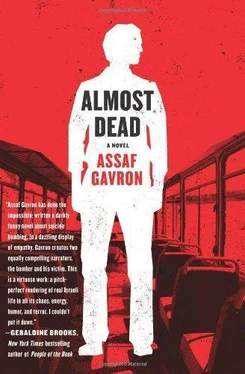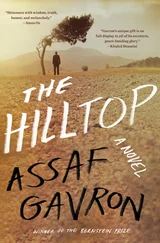She got a reply. ‘Hello,’ she said, in a sexy voice. ‘This is Shuli.’ I could hear a man’s voice answering. She pulled a face which meant: what am I supposed to say now? I shrugged — just exactly what should she say?
‘Who am I speaking to? Oh, hello: Binyamin. Listen, I’m Giora Guetta’s girlfriend. You heard what happened to him?’
She listened for a few seconds.
‘You don’t know him? But he’s got a meeting with you written in his diary. That’s how I got this phone number. Sorry…hello? Hello?’
She took the phone from her ear and gave me a confused, rather drunken look.
‘He doesn’t have the faintest idea what I’m talking about.’
‘We’ll go there. We’ve got an address…’
‘Now?’
‘Whenever you say.’
‘Tel Aviv would be too much for me right now,’ Shuli said. ‘Maybe tomorrow. Take me to work.’
I very much wanted to kiss her. But all I said was, ‘Are you sure?’ and she was.
‘ Good morning, Svetlana, how is he? Keeping clean? Reactions? ’
‘ His father said he opened his eyes for a moment yesterday. Apart from that, nothing. There’s increased perspiration. And when you play him tapes of Amr Diab, his face looks calmer… ’
‘ When you play what? What about nutrition? Infections? Pupils? ’
Not the torch, not the torch! Don’t you dare, Svetlana…
‘ The nutrition’s going fine, Doctor. Up one point three kilos since he arrived. Excretion is textbook. No infection of the wounds. The massages are working .’
‘ Good. What day are we on? I think very soon we’ll have a good idea which direction this is all heading .’
The tiny apartment in Al-Amari was part of Grandfather Fahmi’s and Grandmother Samira’s house, which had been crudely subdivided into four flats. Over the years different branches of my uncles’ and aunts’ families lived in the various sections. There was a shower into which I now crammed myself, and a toilet bowl. Apart from the shower, there was a small room with a small sink and a small refrigerator on one side and a small bed, a small round table and a small TV on the other. Whoever didn’t get the bed used the spare mattress that was propped up against the dirty yellow wall. The refrigerator contained milk, a few Al-Juneidi yogurts, a couple of eggs and some stale vegetables. Coffee, teabags, salt and a few pitas could be found on its top. A bare light bulb in the middle of the room supplied light during the day, since not enough sunlight came in through the crack in the wall above the sink or under the door.
I showered quickly and started tidying up, emptying the overflowing ashtrays, getting rid of the empty bottles and the paper wrappings, the rotten cucumber in the fridge, the debris on top of the TV and the round table. I made the bed, folded my clothes and gulped down a yogurt and only then noticed how hungry I was. I filled a pot and boiled some water with a potato and an egg. When they were cooked, I peeled them and cut them into a bowl, found a half-full tin of tuna in the fridge and added it. What a delicacy! Only then did I turn on the TV: music videos from Lebanon — just what I fancied.
‘ Dr Hartom says you’re getting better all the time. But they’re still out there with their signs. Did you really do what they think you did, to the Croc? I used to like him when he was on TV, but not as much as I like you, Fahmi. I just don’t believe them. I mean, they say your brother’s a real terrorist, but you, I see you and I just don’t believe you could have done that to the Croc .’
The Croc? Where is he? We’re on the beach, in his green car. I’ve an apple and a pomegranate for us to share.
Oh, man, I’m too hot. I’m burning up here…
‘Is the bomb ready?’
‘Almost.’
Bilahl came and ate the tuna salad I’d left him, talking on the phone in a low voice. He switched over to Al-Jazeera: the bombed building in Al-Birah, where Halil Abu-Zeid had been killed. There were children searching for remains in the rubble. Bilahl watched it in silence, and left again. I rinsed my eyes with a dose of Shirin Abu-Akla, who was reporting, and when she finished I returned to the videos from Lebanon.
Lulu called from Murair. Father was sick, was worried about us. I told her to forget about Father’s worrying and tell me how she was doing. What had she done today? How had school been? I hadn’t seen her for months. She said she’d seen Rana.
I loved Rana. We grew up together. Because of her I was who I was. She was part of me. The only one. I missed her. But I had to leave her behind. Had to leave Murair behind. My sister, my father, my future. And now I was in a whole other place. Al-Amari. Bilahl, television.
I watched the dancers on TV and closed my eyes.
Bilahl wanted to carry out the attack as soon as possible, in revenge for Abu-Zeid’s murder. He wanted them to know we could respond immediately. The shahid would refer to Abu-Zeid in the video to make it quite clear. To make them understand that their helicopters and missiles didn’t scare us and wouldn’t stop us. But Halil himself thought that it would be better to keep quiet for a few days, I said.
‘Yes,’ said Bilahl. ‘But it’s for him that it’s important to do it quickly.’
I looked into his dark eyes and suddenly felt a strange surge of grief through my chest. I buried my face in my hands. I didn’t mean to. My brother laid a hand on my heaving shoulders.
In the afternoon I went out into the camp to breathe some fresh air. Women with baskets on their heads. Green grass, yellow mustard and red poppies growing beside the dirt roads. I plucked a leaf from a big fig tree. Behind the mosque the camp’s football team were practising on a pitch with a huge puddle in its centre circle. I sat beside several other bored guys and watched, the sound of ping-pong games from the club next door clicking in my head like a metronome. Al-Amari’s football team had won the West Bank championship a few times but since I arrived at the camp, they hadn’t been up to much. Maybe I was bringing them bad luck. I found a shekel in my pocket and bought two bananas from one of the stands. How pleasant to sit and eat a banana on a cloudless winter’s day. Children were kicking a ball against the wall, as they did whenever I passed that spot. Life here doesn’t change, I thought: only the slogans on the walls, and even they stay essentially the same. Any time now, my brother would be sending the kids with the green, black and red spray-cans out to praise the shahid Halil Abu-Zeid and to demand his revenge.
The Istishadi was a guy called Naji, whom Bilahl met in the mosque earlier that morning. Bilahl said his true intent was to go to God. He’d known Abu-Zeid in the mosque and wanted revenge immediately.
‘But how well do you know this guy? How long ?’
‘I trust God. I try to sense the person. But I never know. How can one know what anyone’s got on the inside? Naji looks good to me. A relaxed type. Strong nerves. But I might be wrong. I’m trying to find out about him and his family.’
‘And if you’re wrong?’
‘If I’m wrong, that is the will of God.’ Bilahl spoke with a businesslike assurance. He had taken Abu-Zeid’s responsibilities upon himself. I didn’t know whether or not he’d been given the role officially, or who he knew higher up in the organisation. ‘In any case, he doesn’t know my phone number or my real name. You’ll show him how the explosive works. Apart from the two of us he won’t see anyone or be allowed to call anyone. He’ll come to the operations apartment, and from that moment on he’ll be cut off from the world. On the last night he’ll sleep here.’
Читать дальше












